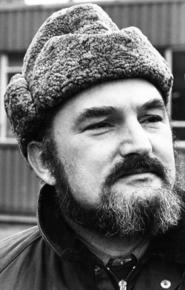Born in 1925, Alan Brien is a novelist,
journalist and critic of distinction. Serving as
an air-gunner in the RAF in the War, he
enjoyed a long and successful career in Fleet
Street, writing variously for the Daily Mail,
the Sunday Dispatch, Sunday Pictorial,
Sunday Telegraph, Spectator, New Statesman,
Sunday Times, Evening Standard, Punch, as
well as being a regular broadcaster on radio
and television. In 1987, his novel on Lenin
was published. Now retired, Alan lives in
North London.
Bless My Soul
by Alan Brien
(“Sacred Cows”, Sunday Times Magazine, 3rd April 1977)
If there is any creature I find less
sympathetic than a sacred cow, it is the
sacred cowherd. And this, it seems to me, is
Malcolm Muggeridge’s true role.
Our sacred cows in the West, like living
goddesses of Nepal, are quite often more to be
pitied than resented. It can be very lonely, rather
tiring and frustrating, above all, being above all,
not much fun up there on the pedestal. Yon are
never allowed to be fallible, gullible, irritable or
wrong. But the cowherd, working on his
percentage, can always plead that he is only
human. He is just the front man for a mystery that
cannot be approached direct. So every guru has
his chila, every champ his manager, every star his
agent, every freak his barker, every gangster his
mouthpiece and the perennial aim of the power
behind the throne is to outlast the power behind
the throne. Our hero, MM, has survived in the
same way by herding many a sacred beast to the
sacrifice without singeing even much more than
his own eyebrows.
The voice is the voice of Malcolm, the
mug is the mug of the Mugg, but the message
must always be the message of the Lord. Now it is
the Lord God, but it has been the Lord Camrose,
also General-Secretary Joseph Stalin, also the
Manchester Guardian, also Mr Punch, also the
BBC. Malcolm Muggeridge is a cowherd for all
seasons – he must never be blamed personally for
where his sacred cow of the decade leaves its
sacred cow pats.
There is no problem charting
Muggeridge’s succession of causes. Indeed, he
has documented the primrose path in his own
volumes of autobiography. He likes to identify his
own part in life’s soap opera as increasingly that
of “a displaced person”. I would substitute instead
“a born defector”, or perhaps “the natural doubleagent”.
The difference is not always easy to detect
as Muggeridge, who also occasionally likes to
present himself as a sometime secret-service man,
has good reason to know.
The pattern, as I see it, is of an eloquent
advocate – a word spinner and jest-juggler
without peer among advertising copywriters –
who too easily becomes imprinted by the allembracing
gospel he is asked to preach, then
equally suddenly rejects the imprint, only to
emboss upon his psyche another monolithic creed.
After each failure the revulsion is dramatic,
permanent, possibly near hysterical.
For example, as a young man he wrote
leaders for the Manchester Guardian, full of
simple faith in progress, the classic doctrine of
liberalism. Even 40 years later he is still
denouncing that innocent idealism in terms of
manic hyperbole: “Liberalism [he wrote in 1965]
will be seen as the great destructive force of our
time: much more so than Communism, Fascism,
Nazism or any other lunatic creeds .... Compared
to the long-term consequences of Gilbert Murray,
Bertrand Russell and Mrs Eleanor Roosevelt,
Hitler was an ineffective dreamer, Stalin a Father
Christmas and Mussolini an Arcadian shepherd.”
He went to Moscow in the mid-1930’s,
anticipating the foundation of Utopia, and
prepared to sell up and settle there forever.
Disillusioned, he has never ceased denouncing
everyone on the Left, even those who never
shared his naive expectations, as dupes of the
Kremlin. After the war he wrote leaders for the
Telegraph as assistant editor, and it is the Tory
leaders he supported then he now places in the
pillory. He came to fame as a combative, critical
Editor of Punch – a magazine he has since rarely
missed an opportunity of denigrating. And he
finally established himself as a household image
on television, with his knobkerrie face and that
strangulated voice which, next to Edward Heath’s,
must be the most extraordinary and artificial of
any public man. Yet his favourite topic is a
denunciation of TV as a medium fit only for
hucksters and charlatans, guaranteed to process
reality into trivia.
For an intellectual of his repute, many of
his essays are curiously ill-informed, selfcontradictory
or just plain silly, better fitted for
the Sunday Express than the Guardian or the
Statesman, or even the Telegraph, despite a
surface glitter of sequinned rhetoric. The
quotation on liberalism is one standing for many.
Muggeridge on contraception and abortion, with
he loathes with a virulence which seems barely
rational, will seize any stick, however feeble and
rotten.
________________________________________________________________________________
Subscribe to:
Post Comments (Atom)

No comments:
Post a Comment